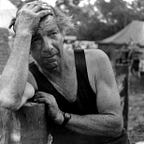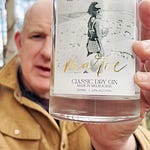Andrew Rule is a Gold Walkley winning journalist in Australia, one of the great newspaper writers of all time in this country, who also coauthored the Underbelly series of books.
He gave this piece the title ‘Solomon in a singlet’ when it first ran in The Age a few after his father’s death from cancer in June 1998. At the funeral, Andrew read the text pretty much verbatim, with a few adlibs. He regards himself much more as a writer than as a speaker, and there’s so much care in the construction of this one.
There is no surviving audio of the actual delivery so Andrew was good enough to record a read for the podcast.
To just hear the speech part, go to the Speakola page.
There’s so many reasons why this is a great eulogy, many are to do with Andrew Rule being an incredibly gifted and experienced writer, but here are a few pointers that might help a less experienced writer construct a eulogy:
it’s written in the second person. This ups the emotional impact. A lot of eulogies shift to second person for the final farewell. It’s tough to maintain second person for a whole speech, emotionally draining, but can be very effective;
a meaningful physical object as a motif — in this case it’s the axe.
a phrase that the deceased used, repeated for effect. ‘Neat as you please’ is the one here. In another Andrew Rule eulogy, for friend and colleague Les Carlyon, he repeats, ‘Won’t keep you, Les’;
contrast between the vitality of life lived, and the recent experience of dying. This is particularly poignant here. ‘It took a while, Dad, but you've finally run up against something you can't fix with the axe. It's cancer, though none of us knew that until it was too late.’
It’s a beautiful transcript. I’ll add it below.
Andrew Rule and I ‘swapped podcasts’ so to speak and I’m his current guest on ‘Life and Crimes’. We talked about roguish AFL footballers in an episode called ‘Black Sheep in Footy Boots’.
For Keith Rule: 'Solomon in a singlet', Andrew Rule - 1998
27 June, 1998, Lake Tyers, Victoria, Australia
The morning after we got the news, I went out to your woodheap. There was that big old axe you used in the bush all those years ago, just as you'd left it, stuck in the chopping block like a signature. I split wood until the memories and the tears came flooding in. Then I dropped the axe back in the block, nose down, handle sticking up, as neat as you please. Just like you would, Dad.
Remember how we used to get around in the old Blitz army truck, the one you'd bought when you were 16 and drove for years before you got a licence? I hadn't started school, but I'd begun my education, sprawled on the petrol tank that doubled as a seat, my head on your lap, lulled by the old side-valve V-8 grumbling away behind its thin tin cowling.
I watched the way you used to pat the old girl into gear, those huge work-stained hands easing the gear stick through the unforgiving crash box while you double-clutched and caught the revs just right.
"Listen to her," you'd say as we labored up a hill with tons of timber or a bulldozer on the back, "slurping petrol fast as you could pour it out of a two-gallon bucket." And you'd laugh and sing King of the Road.
You turned 24 the week I was born, so I remember you as a young bloke, a father of three boys by 27. Fair-haired, under six foot and around 13 stone in the old scale, equal parts bone and muscle, common sense and good humor, wrapped inside a blue singlet with the honest smell of sweat and gum trees. You didn't alter much in 30 years. Later, people sometimes took us for brothers born a dozen years apart.
Like the best dogs, horses and people, you were tough, but never mean. We'd marvel at how you picked up hot coals when they fell from the fire, juggle them casually and toss them back. Your heart was a lot softer than your hands. Once, when a visitor produced sandwiches she'd made specially, you saw the one she offered had been fly-blown on the trip. Rather than hurt her feelings, you took it, thanked her, and ate it.
Chivalry, Mum called it.
Whatever it was about you, we liked it. Little boys in books wanted to be firemen or train drivers, but yours wanted to be sleeper cutters, like you.
You'd set up your landing in the shade, preferably to catch a lazy afternoon breeze sneaking up a gully from the lake. You'd fall a tree, measure off nine feet the ancient way, stepping out the log heel to toe, then saw it off and snig it to the landing with the tractor.
You'd belt the bark with the back of the axe to loosen it, then slit it open and lever it off as easily as a slaughterman skins sheep. You'd save sheets of stringy bark and, if it rained, we'd lean them against a tree, shelter under it and drink sweet coffee from your steel Thermos.
You used most tools well, but the axe was your favorite. Your good axe had an oversized head, razor sharp, and a succession of hickory handles worn silky smooth with use.
You could do nearly anything with it, and did.
At lunchtime, you'd put the sandwiches on a fresh-sawn sleeper, which smelt so sharp and sweet and clean, and cut them from corner to corner with the axe, as neatly as if you'd used a kitchen knife. You used it to sharpen the stubby carpenter's pencil for marking the ends of the logs. You used it as delicately as a scalpel to notch the ends of the log - right on the pencil mark - ready for the string line.
And, when you finished with the axe, you'd casually drop it, nose first, into the boards and stick it in perfectly, every time, with the handle rising just right. As neat as you please.
You'd shake the battered tin of blue powder to coat the string, stick it in those tiny cuts at each end, pull it taut, pluck it up and twang it. Presto! A straight blue line on the wet, virgin sapwood. You started the swing-saw and backed it rhythmically down the log, the machine straddling it with skinny legs on tiny tyres, the howling circular blade's cruel shark teeth throwing up a plume of sawdust as graceful as a rooster's tail
And that's when your little boys got a chance to sneak into the bush, dragging the axe. We'd cut a whippy wattle stick, and "borrow" a length of your good cord as a bowstring. But only if you'd notch the ends of the bow with the axe. You always did, and more besides.
Sometimes, with two sure hits and a quick trim, you'd make a cricket bat from a sleeper offcut. You made us a ripper billy cart, the chassis made of hardwood, the front tapered with the axe, the steering a piece of light rope, like reins.
Your own childhood had been spent fishing, riding, shooting and swimming, and you always had a soft spot for childish pastimes. But you had limits. One day we squabbled too much over the swing you'd made with a tyre and a rope, slung from a big roundleaf tree. You vaulted the fence, axe in hand, and cut the rope without a word. Solomon in a singlet.
Later, after we'd reflected on our sins, you put the swing up again. That was you, Dad: slow to anger, quick to forgive and forget, always practical. You were never keen on punishment or revenge, and mostly turned the other cheek. About all that made you angry was injustice to another person or cruelty to animals.
You despised callousness or misplaced sentimentality that let animals suffer. If they were sick or injured, and couldn't be helped, you put them out of their misery.
With a bullet - or a lightning strike with the axe. "Quick and clean," you used to say. You always gave an old dog or an old horse a good feed and a pat before they took the walk from which only you returned.
Not that you liked killing anything. Remember your youngest boy conning you to let a sheep go instead of slaughtering it? You decided we could go without fresh meat rather than upset him. One of the few times I saw you angry in public was when you fronted a youth being rough with sheep in the saleyards. He got the message.
Our world was small, and it seemed to us you could do nearly anything in it that was worth doing. You could swim strongly, box a bit, shoot well and drive anything, and you taught us how. You'd started work at 14, got the truck at 16, had a bulldozer not long after you got the vote, and a pilot's licence. And, later, a couple of boats that gave us golden memories of summers on Lake Tyers.
You knew a thousand practical things, wisdom won from experience as a farmer and bushman. Like the shine on your axe handle, it came only with time and hard work, but you were always willing to share it. All our lives you've shown people how to do things in that easy-going way, and kept learning yourself. "You can learn one thing from anybody," you always said.
You could sharpen any saw. You were a bush carpenter and mechanic, a handy welder and blacksmith. You grew up around horses, and helped drove cattle as a boy. You could stitch harness, use a stockwhip and a branding iron. You milked 26 Jersey cows and raised pigs. You could tan a kangaroo hide, set a wild dog trap, whistle a fox, rob a beehive, butcher a sheep or shear one. You could mend a chair or chair a meeting.
You cleared land, burning windrows and stumps, and sowed down pasture, but never wasted a stick of useful timber. You could quote Paterson and Gordon by the verse and drop a line of Shakespeare, Steele Rudd, Runyon or the Bible to suit most occasions. You could play tunes on a gumleaf, sing a lullaby in the local Aboriginal dialect, or make a bark humpy - a legacy of growing up on Lake Tyers Aboriginal station, where you were the only white player in the football teams of the early 1950s.
You played on heart and toughness. You had to. You played hurt every week because of what you nonchalantly called your "crook foot", a twisted instep caused by childhood polio that left you with a lifetime limp.
But your foot didn't stop you rucking four quarters without a rest in Nowa Nowa's winning grand final team of 1956. Your mates chaired you off the field, and they gave you a trophy for the most determined player. Mum still laughs about how all the local girls lined up to kiss you after that legendary game.
FOR A man who cut down plenty of trees, you loved them. You knew individual trees among thousands, and could find them in the bush years afterwards. You could look at a piece of sawn timber and say if it was grey or roundleaf box, mahogany or messmate, silvertop or stringybark.
Once, you amazed a neighbor by glancing at his new stockyards and telling him exactly where he'd poached the red box timber from, deep in the state forest two kilometres away.
When you went wheat farming on the open plains near Bendigo in the 1970s, you missed the tall timber and the whisper of wind in the gum leaves at night.
Perhaps that's one reason you were among the first to regrow trees on country where a century of ringbarking and burning had made bleak, bare paddocks. You planted, fenced in and watered hundreds of trees in a belt running a mile across the farm. You planted roadsides, and made plantations in places where salt was rising to blight the soil.
And still you missed the bush.
Your sleeper quota was gone, but you were younger than most sleeper cutters you'd known, and still strong. You'd been one of the last in East Gippsland to start out with a crosscut saw, a broadaxe and splitting wedges, tools that hadn't changed much since medieval times.
You learnt from axemen who'd worked in the bush since the turn of the century, and you spent your teens splitting logs into billets, then squaring them into sleepers with the broadaxe. And you never forgot how, even after chainsaws and swingsaws took over. Which is why, when Victoria's oldest farm, Emu Bottom, at Sunbury, needed authentic mortised posts and split rails to restore it so a television series could be filmed there, you took the contract. The owner, who was to become a friend over the following 20 years, was resigned to buying rare old fences to rebuild, but you told him you could split new posts and rails the traditional way. He was delighted.
And so began your second life as a bushman.












